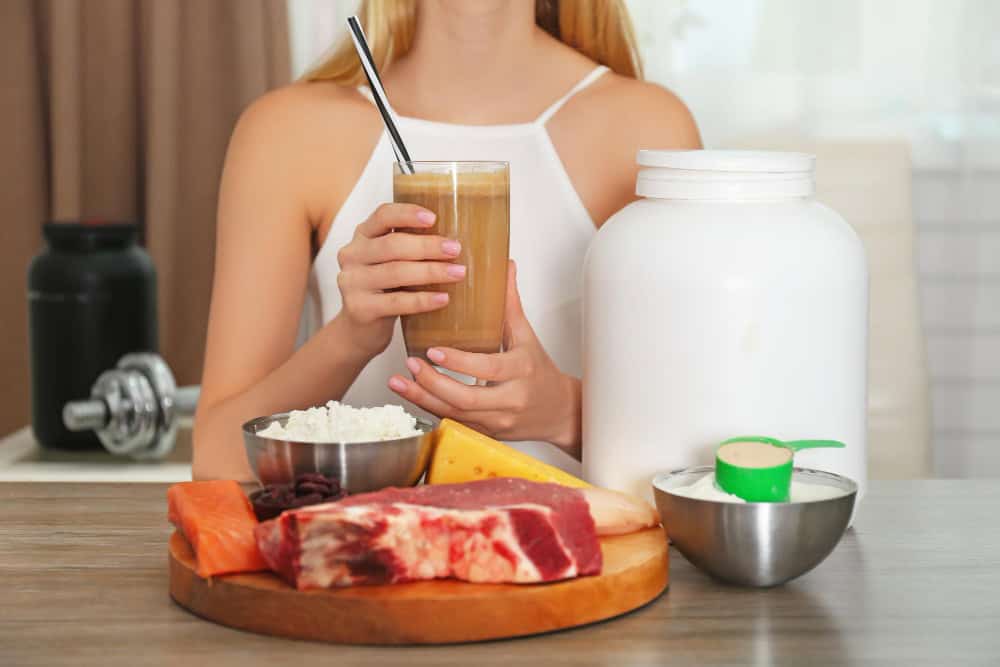
While protein is a superhero nutrient that we need to help build and repair muscles, bones, skin, and organs, support the immune system, and produce important hormones and enzymes, more is not always better. As it is said, excess of anything is bad. Taking too much protein can be damaging to your body, particularly your kidneys. Consider your kidneys as little filters working day and night; they can manage plenty, but not overload.
Let’s break down the 5 common protein side effects on the kidneys along with some easy, practical ways to safeguard your kidneys while still obtaining all the protein your body requires.
1. Relying Only On Animal-Based Proteins

We all tend to take in a lot of animal protein. The protein sources like egg, milk, and meat are all rich in high levels of protein, and if we consume animal proteins, or overconsume them, they can also increase our body’s acid levels, which can impact our kidney health in the long run. So start adding up plant proteins like chickpeas, lentils, tofu, quinoa, and beans. All of these are rich in fibre and have a greater amount of nutrients in them. Creating a balanced mixture of animal and plant proteins in your diet can be the best alternative and can reduce protein side effects on the kidneys.
2. Ignoring The Signs

One of the biggest mistakes people make is ignoring the body’s early signals of kidney damage. Constant fatigue, swelling in ankles or feet, foamy urine, or stubborn high blood pressure are common symptoms of kidney damage that are not to be taken lightly. These can be early signs that your kidneys are struggling to filter waste effectively, often due to overusing protein powders or eating excessive red meat. Ignoring these red flags delays diagnosis, making treatment harder. If you’ve been consuming a high-protein diet or protein powders, staying alert to these early changes can protect you from the serious protein side effects on the kidneys.
3. Taking Too Many Supplements

We casually grab protein shakes, bars, or powders during busy days or after workouts without thinking twice. But overdoing them can lead to protein side effects on the kidneys and even upset your digestion. So try to have whole foods like lean meat, fish, or eggs, or lentils as a primary protein source, and let supplements play only a supporting role. Always read the label, know how much protein you’re consuming, and never self-prescribe; your doctor is the right guide for your needs.
CTA: To know more, talk to an expert
https://www.1mg.com/online-doctor-consultation
Quick hack: Treat supplements as sidekicks, not superheroes — and your kidneys will thank you.
4. Skipping Routine Kidney Function Checks
Even if you feel healthy, skipping routine kidney checks is a risky habit. Long-term usage of protein powder and high-protein diets may quietly burden your kidneys, and the damage often goes unnoticed until it’s severe. According to the CDC, nearly 1 in 10 adults may already have chronic kidney disease (CKD), yet most are unaware of it*.
Simple, affordable tests, like a serum creatinine/eGFR blood test and a urine protein test, can detect early damage. Making yearly kidney function tests a habit ensures you catch any hidden protein side effects on the kidneys before they escalate into something serious.
Not everyone at risk presents with the typical symptoms. Always seek professional advice and get your kidney health parameters checked regularly.
CTA: Book Test
https://www.1mg.com/labs/test/KFT-with-Electrolytes-(Kidney-Function-Test-with-Electrolytes)-32826
5. Not Keeping Yourself Hydrated

When it comes to protein, your body breaks it down, and waste products are released into your blood (like urea) that your kidney filters out. But if your body doesn’t have enough water, the byproducts may accumulate and increase the demand on your kidneys. That’s why you should drink water from time to time throughout the day, helping your kidneys to eliminate the waste byproducts of protein, making them healthy and efficient with their process.
Bottom Line
Protecting your kidneys doesn’t require neuroscience, and you also don’t have to cut back on protein altogether. Just simply be wise with your choices of eating. Over time, such habits can put a lot of stress and unnecessary burden on the kidneys. Your kidneys are working hard for you every day, filtering out waste and maintaining the equilibrium of the body. Give them some love and support by spreading your protein sources evenly over the day, adding plant-based protein sources also, and keeping your water bottle close by.
Reference:
https://www.cdc.gov/kidney-disease/media/pdfs/CKD-Factsheet-H.pdf
Recommended Reads:
Let’s Talk Protein Powders: Which One Fits Your Lifestyle Best?
Soya Chunks: The Plant Protein Superhero for Weight Loss & Health
FAQs
Q. What proteins are bad for the kidneys?
Consuming excess amounts of ultra-processed or ultra-concentrated protein sources, such as protein powders, protein bars, and too much red meat, over time can damage the kidneys. So it’s best to have low-protein sources, such as lean meat (chicken and turkey), fish, eggs, legumes, and dairy products.
Q. How to improve kidney function fast?
You can’t instantly just improve your kidney function, but constant efforts and healthy habits can go a long way. You can start by eating plant-based protein or a balanced mixture of plant and animal-based proteins, staying hydrated, and thus avoiding overloading.
Q. Which protein is good for kidney patients?
Plant-based proteins like nuts and beans etc., are generally easier on the kidneys than animal proteins, as they produce less acid in the body than plant proteins. But it’s always recommended to consult your doctor or dietician before taking anything.
(The article is reviewed by Dr.Subita Alagh, Assistant Team Lead, Disease Content.)